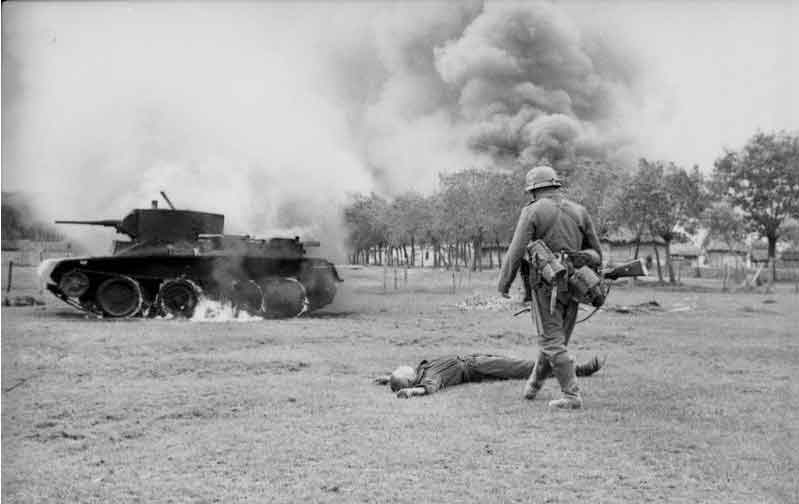June 1941 Operation Barbarossa the Germany Invasion of the Soviet Union

German Invasion
German forces invaded Russia. The Germans advanced on a 2,000-mile-long front. Together with their allies, they were able to amass 3,000,000 troops. Initially, the Russians had 2,000,000 troops. German troops advanced along the whole front. By September, they began laying siege to Leningrad, and then captured Kiev. By the end of October, the Germans had reached Crimea in the south and Moscow's suburbs in the north.
In August 1939 Germany and the Soviet Union signed a non aggression treaty. While the Soviets had no delusions that this would bring perpetual peace with Germany, Stalin believed that the treaty would give the USSR a number of years to prepare for war. He believed that Hitler would first want to defeat Great Britain before turning Eastward. Hitler did indeed hope to defeat Britain first, but when the Battle of Britain failed to defeat the British, Hitler decided to turn East. Starting in February 1941 the Germans began to amass troops close to the border. The attack on the Soviet Union was initially scheduled for May 15 1941, but Hitler’s decision to invade Yugoslavia and Greece forced him to delay the attack.
The German prepared the largest invasion force in history with 3.8 million men, 3,350 tanks, 7,200 artillery pieces and 2,770 aircraft. Stalin had been warned by the British that the Germans were going to attack, but dismissed the warning believing that British trying to draw them into the war. The Soviets had a larger army with over 5 million under arms and another 14 million in reserve. They had more tanks with 23,000 of which 14,700 were combat ready and their best tanks were better than any German tanks. Unfortunately for the Soviets their army was not well organized and they were not prepared for war.
On June 22, 1941 the German army began the invasion of the Soviet Union. Like all their invasions the Germans began their invasion with air attacks across the front and deep into the Soviet Union. The German air attack was successful destroying much of the Soviet command and control. The Germans attack took place simultaneously on four fronts, on the Norhern front through the Baltic States. By July 2, the German offensive had covered 280 miles and was nearing Lenningrad. In the South the German advanced all the way to the outsets of Kiev in the Ukraine. Throughout their advance the Soviets encountered repeated Soviet counterattacks.
The Germans also advanced through Belorussia where they encountered heavy resistance.
A major attack advanced toward Moscow as well. Despite the Germans success the German army came to realize major fact, first that the Soviet Army was larger than they had realize and that they were not going to collapse quickly. Hitler came to the conclusion that he needed to capture the major economic centers of Russia including Leningrad, and the oil in the Caucasus and to put less emphasis on capturing Moscow in order to squeeze the Soviets. The change in direction would prove fatal for the German efforts.
 >
>